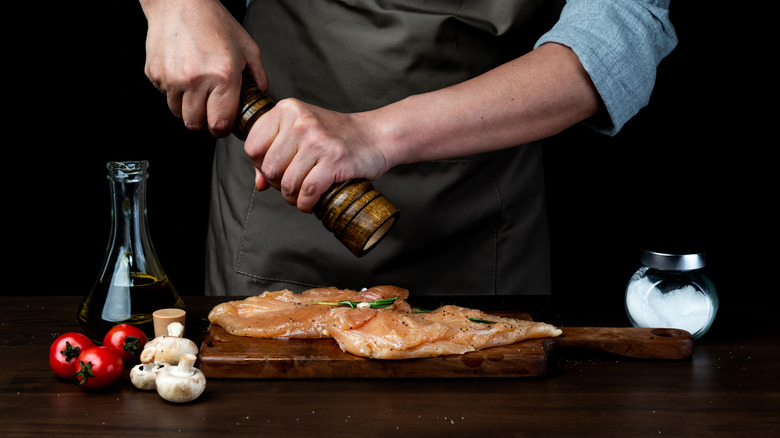Why Daphne Oz Never Peppers Meat Before Cooking It
Whether it's chicken, beef, or pork, cooking meat is no easy task. It requires a little more finesse and attention than, say, boiling a pot of pasta or steaming broccoli. You not only have to make sure it's cooked to a temperature that's safe to eat, but you also have to prepare it in a way that leaves it flavorful and juicy. There are few things worse than a dried-out chicken breast or a bland steak with the texture of leather.
Everyone has their own opinions on the best way to prepare meat. Gordon Ramsay insists in his MasterClass course that chicken should come to room temperature before it's cooked — never use it straight out of the fridge. Andrew Zimmern says the art of perfectly cooking steak is all about turning the meat frequently while it grills.
Another step some chefs swear by is peppering their meat prior to cooking it. However, that's something that Daphne Oz, co-host of "The Good Dish" and former co-host of "The Chew," might never do. In a recent TikTok video, she explained why she never peppers her meat — and why she doesn't recommend it for any home cook.
Daphne Oz says peppering your meat could give it a burnt flavor
For starters, why is peppering your meat before cooking it a common step? Adding fresh pepper prior to grilling, searing, or roasting can allegedly make the meat more flavorful and possibly moister (via Food & Wine). However, Daphne Oz disagrees. "Unpopular opinion: don't pepper your meat before cooking," she captioned her TikTok video, in which she explains this anti-pepper position before putting her chicken in the pan. "Pepper can burn very easily if it's left in one place for too long, and it gets a very bitter flavor very quickly," she said, adding, "I like to pepper it fresh or right when it comes out of the pan."
Another potential reason not to add pepper to your meat beforehand is that it can affect how the food cooks. According to Lifehacker, the peppercorns create a rough surface so your hunk of meat doesn't touch the pan on all edges and you end up with an uneven sear.

